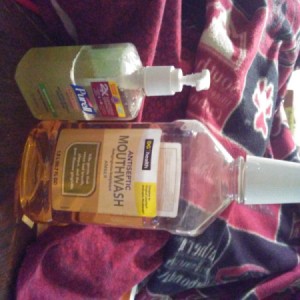Most mouthwashes are antiseptic , which make them very useful for eliminating bacteria, particularly after a procedure that has left a wound like a tooth extraction. However, this does not automatically make them safe to use after you have had a tooth removed. Using an antiseptic mouthwash helps to control the level of bacteria inside the mouth , while also keeping your breath nice and fresh.

A few precautions can ensure your recovery is hassle-free. Avoid spitting, rinsing, or drinking and eating hot things for hours. After that, make sure you rinse with an antiseptic mouthwash or salt water. This wonder herb can help with wisdom tooth pain as well. If bleeding continues, stop all mouth rinsing and follow the instructions regarding bleeding.
The teeth should be brushed with toothpaste. Make sure to avoid swallowing it. Clean your tongue with a tongue scraper. As a general rule of thumb , you should refrain from using mouthwash for at least one day post-extraction.
If you use mouthwash too soon, you will run the risk of dislodging the blood clot that is necessary for proper healing after a tooth extraction procedure. Once you’ve been careful to observe the one-day rule,. Salt water mouthwash rinses are an excellent short term treatment when you have wounds in the mouth, for instance, when you’ve had teeth removed.
The reason they are so good is that the salt is not only a natural disinfectant, but it also removes any swelling from the tissues. So using salt water for two or three weeks post surgery, or if you. Rinse your mouth every two to three hours for the first few days after surgery, then use it three to four times a day thereafter. You can use the rinse to: soothe and heal mouth sores.
Best Oral Rinse For Fresh Breath. Say Goodbye To Bad Breath Today. Free Shipping On Orders Over $49! Choose antiseptic mouthwash to combat bacteria and other sources of potential infection. Chilled — not frozen — cucumbers afford pain relief.
You want to avoid freezing them to prevent ice burn on your face. However, you should be aware of them. Wisdom Teeth Extraction Complications.
Bleeding from the extraction website can cause both a smell and an unpleasant taste in your mouth. Drinking water can help after you have actually stopped bleeding. After hours, you can make use of mouthwash or warm seawater to rinse your mouth. Onions contain antiseptic , antibacterial and anti-inflammatory properties that can help relief toothaches and kill germs that may be able to lead to the infected wisdom tooth.
Yes, after wisdom teeth removal you will have a swollen face. Take those sick days that you have been saving up from work and have a little ‘me time’ at home as you recover. If you are too much addicted with mouthwash rinsing process then the first hours after extraction the patients should be avoiding mouthwash. These are the cause of bad breath and if you follow these steps, you can easily get rid of this problem. Be sure to call your dentist if pain or bad breath continues after three days following the extraction.

No matter the reason, it’s important to look after yourself afterwards. Here are home remedies for tooth extraction healing that can help you reduce discomfort while you’re healing. Mouthwashes with chlorhexidine, for example, can help to both relieve swelling and pain, and keep your mouth free of infection. Why keeping wisdom teeth clean takes diligent effort.
You can’t take care of your wisdom teeth the way you do with other teeth in your mouth. Their location and position in the gum tissue often makes these teeth predisposed to: Impacted food. Gum disease and periodontal pocket formation.
However, irritation of the sockets from Listerine may even be counter-productive,.
No comments:
Post a Comment
Note: Only a member of this blog may post a comment.